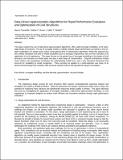Data-driven approximation algorithms for rapid performance evaluation and optimization of civil structures
Author(s)
Tseranidis, Stavros; Brown, Nathan Collin; Mueller, Caitlin T
DownloadSubmitted Manuscript (1.282Mb)
PUBLISHER_CC
Publisher with Creative Commons License
Creative Commons Attribution
Terms of use
Metadata
Show full item recordAbstract
This paper explores the use of data-driven approximation algorithms, often called surrogate modeling, in the early-stage design of structures. The use of surrogate models to rapidly evaluate design performance can lead to a more in-depth exploration of a design space and reduce computational time of optimization algorithms. While this approach has been widely developed and used in related disciplines such as aerospace engineering, there are few examples of its application in civil engineering. This paper focuses on the general use of surrogate modeling in the design of civil structures and examines six model types that span a wide range of characteristics. Original contributions include novel metrics and visualization techniques for understanding model error and a new robustness framework that accounts for variability in model comparison. These concepts are applied to a multi-objective case study of an airport terminal design that considers both structural material volume and operational energy consumption. Key Words: surrogate modelling, machine learning, approximation, structural design
Date issued
2016-12Department
Massachusetts Institute of Technology. Department of Architecture; Massachusetts Institute of Technology. Computation for Design and Optimization ProgramJournal
Automation in Construction
Publisher
Elsevier
Citation
Tseranidis, Stavros, Nathan C. Brown, and Caitlin T. Mueller. “Data-Driven Approximation Algorithms for Rapid Performance Evaluation and Optimization of Civil Structures.” Automation in Construction 72 (December 2016): 279–293.
Version: Author's final manuscript
ISSN
0926-5805